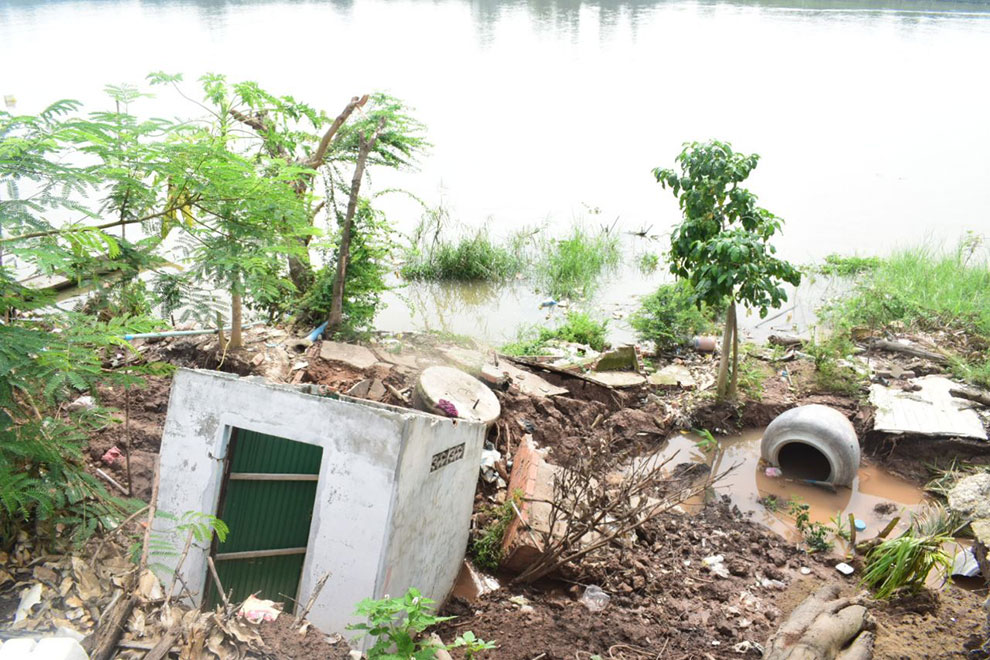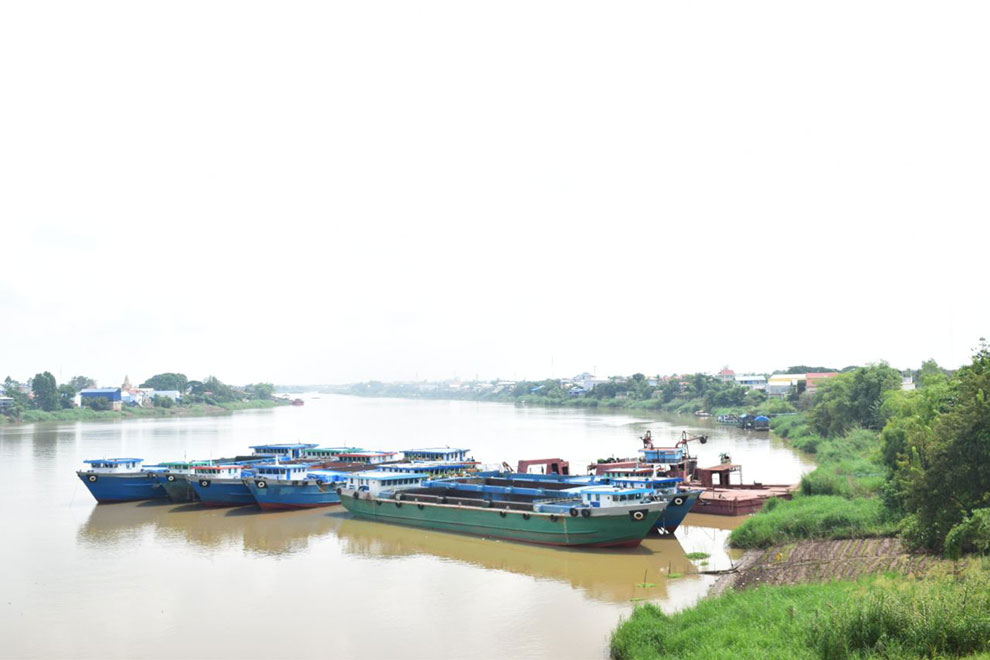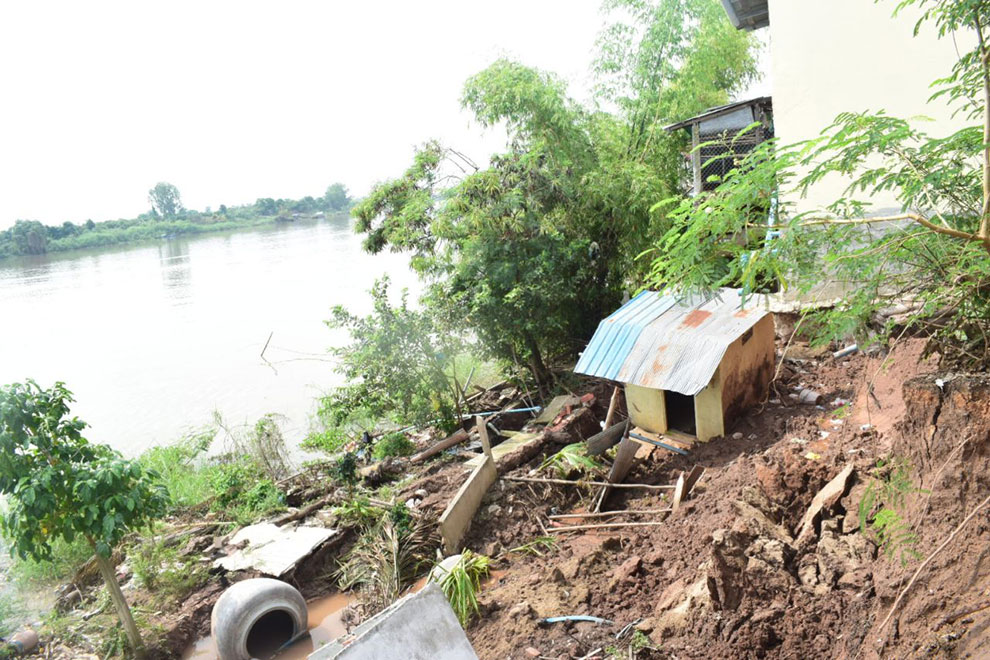SA’ANG DISTRICT, Kandal province — Sitting on an old wooden bed, her shoulders wrapped in a scarf and with her granddaughter in her arms, Heng Yet, 73, is worried that the land might fall away from under her house.
The house, on the Bassac’s riverbank in Raka Khpos commune’s Koh Kor village, is under threat from the commercial sand dredging happening along the river, she says.
The village has been hit with sandbank collapses already. Families have lost their land and houses, and are demanding compensation.
“I have lived here for a long time. It never collapsed before,” Yet says. “I’m very scared, but what could I do? We are just people.”

The land behind the home of housewife Yong Vannary, 24, has already begun to slip away. Her house has cracked.
“I’m afraid when we are sleeping,” Vannary says.
Her washhouse is by the river, and these days she does not dare to go in. “Washing clothes, going to the toilet, taking a bath — I need to go to my niece’s place,” she says.
Sok Chantra, 42, is a victim of the same circumstances. He says the riverbank-collapses only started in the past two years, coinciding with commercial sand-dredging operations nearby.

“These collapses are not natural,” Chantra says.
So far, about 10 meters of land on his property has slid into the river, he says. Before, he had lemongrass and mango trees on the land, he says.
“Water pipes were destroyed, water jars were also damaged,” he says. “I’m helpless for compensation.”
On Aug. 2, 2016, the Leng Chin Group received a license for digging wells and operating a quarry. The license was amended on May 25, 2017, the year the company started dredging sand in the area.
The sand is taken to Phnom Penh, where much of it is thought be used in the country’s ongoing construction boom.
A contract between the company and the commune chief, who acted as a representative of Koh Kor villagers.
However, nine families in nine homes in Koh Kor have been hit by riverbank collapses since the company began operations, according to interviews with residents. They say they have sought compensation, but were told they must take their case to court.
The company did not respond when asked to comment about the claims of damage and lack of compensation.
Mines and Energy Ministry spokesman Yos Monirath says there is no legal basis for compensating victims of riverbank collapses.
Nevertheless, this does not preclude companies from reaching agreements with locals through a contract, or the ministry from intervening on a case-by-case basis, he says.
He adds that there are standard procedures that sand-dredging operations must go through before they can be approved.
Local authorities must approve the site, the ministry must evaluate technical considerations, and the company must produce an environmental impact report, which the ministry assesses, Monirath says.
“If we see that there will be a risk to the environment in the area, we will not allow it,” he says, adding that sand dredging can improve water flows along rivers and help create shipping channels.
But sand-dredging and resulting riverbank collapses have been a recurring problem across Cambodia, with huge amounts of sand formerly exported abroad, including to Singapore to build up the island-state’s landfills.
The issue led to a ban on river sand exports in 2009, according to Global Witness, and an export ban on some types of marine sand in Koh Kong province in 2017. However, sand dredging continues in the country’s rivers for domestic uses.
Lim Kimsor, an activist with environmental group Mother Nature, says people rarely receive compensation because authorities invariably rule that riverbank collapses were caused by natural — rather than human — factors.
“Authorities always give the excuse that it was a natural disaster, but in fact it was not a natural disaster,” Kimsor says. “Every time the problem happens, we’ve seen that authorities do not take any specific measures to protect or help the people.”
Sand dredging also pollutes waterways with oil, making the water unsuitable to drink, she adds.
Kimsor calls for stronger oversight of companies dredging sand. Another environmental activist, San Mala, agrees. Companies have failed to adhere to regulations in the past, Mala says.
Transparency is key to improving the situation, he says. The ministry should show how long companies have had sand-dredging licenses; how deep, within what extents and how much volume they are permitted to dig up; and what their environmental impact assessments have forecast and stipulated, Mala says.
“It causes many problems for the people, damages houses along the riverbank — some fall into the river — it has destroyed roads,” he says.
The grandmother in Koh Kor, Yet, takes off her scarf as she talks and hands it to her granddaughter. She has no other choice but to stay, she says.
Chantra, who has lost 10 meters of his land to riverbank collapse, says the threat is rising day after day.
“The people are scared every day,” he says.








